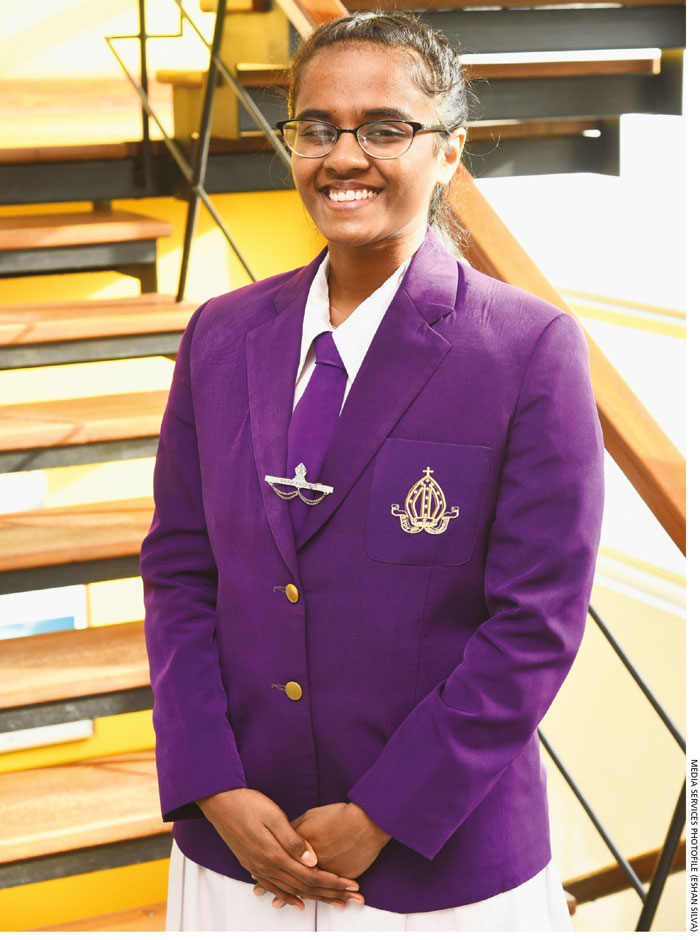YOUTH FORUM
Compiled by Savithri Rodrigo
UNITY IN DIVERSITY
Sayuni Fernando laments that our rich culture has been misused
Q: How can Sri Lanka retain the talent it has?
A: The trend recently has been for many well-educated and talented youth opting to work or study overseas. This can be attributed to the unstable environment, and limited opportunities for higher education and honing of multifaceted talent in our country.
It is very important for the country’s governing bodies to implement continuous learning opportunities that empower talent and have corruption free investment for innovation.
Q: Do we have young leaders who can take the country forward – and what traits should they have?
A: There is no doubt that we have young leaders who are equipped to take the country forward. But whether the appropriate systems are in place to empower youth is not evident.
Young leaders must develop resilience, a sense of self and conscience to stand firm in their beliefs, and put passion into practice in taking the country forward, thereby creating a more just society.
Q: What changes do you see in the spheres of education and women’s empowerment?
A: The present government has made improvements in the education system – for example, shaping the current syllabi to encourage critical thinking and creative power.
This will ensure that children think outside the box, encouraging innovative solutions to pressing problems such as climate change.
While there is a slight change in the conventional perception of women and their role in society, due to deep-rooted social barriers and stereotypes, many women and girls continue to face discrimination in multiple dimensions.
This has been normalised in society and should be reversed with more gender inclusive programmes that not only empower but also remove years of norms that shouldn’t have existed at all.
Q: Do you believe that Sri Lanka would be united one day?
A: I would like to believe that we will be united in the near future. However, one of our strengths – i.e. a rich culture – has been used countless times to cause division.
The ability to coexist in diversity is something we have to learn. Values of unity and coexistence must be instilled from a young age. The school enviro nment plays a major role in the attitudes formed when children enter society. At my alma mater for instance, we learn the true value of working and living in diversity. I have only known coexistence because we were taught that.
nment plays a major role in the attitudes formed when children enter society. At my alma mater for instance, we learn the true value of working and living in diversity. I have only known coexistence because we were taught that.
Everybody deserves respect, irrespective of their personal beliefs or culture.
Q: Where do you see yourself in 10 years’ time?
A: As a person, I don’t see myself any different to what I am today. I hope I’ll continue to have strong principles grounded in my faith in Jesus Christ despite any challenges faced along the way.
I’d like to see myself in an established career, contributing to society and fighting for justice, thereby impacting people’s lives positively.
Q: What are your expectations of the world and its people?
A: I hope to see a world where people are constantly trying to be a better version of themselves, there is consciousness about the society they live in and open-mindedness towards the diversity around them. As individuals, we have been selfish in our actions for far too long. It’s important to be selfless and more conscious to make this world better.
Q: And what challenges do young people face in a global context?
A: Managing the pressure to succeed in every area of life and finding time to do it all is one of the main challenges we face.
Thereafter, success and happiness is measured by how much one has, earns and owns. Materialistic views lead to dissatisfaction, and can undermine mental health and self-confidence.
Q: Who is responsible for climate change and global warming – and what must be done about it, in your opinion?
A: Numerous groups are accused of being at fault or for lack of action, ranging from developed countries and politicians, to the rich and entire communities.
But blaming people isn’t the solution. We must all unite and tackle the problem.
Even if it’s merely speaking up, reducing waste in water and food, saving energy or using renewable energy and fuel efficient vehicles, healing the planet begins in our own garages, kitchens and dining tables.





Leave a comment